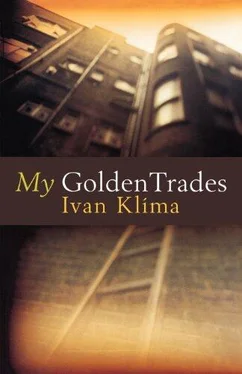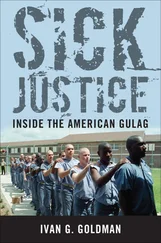Ivan Klima - My Golden Trades
Здесь есть возможность читать онлайн «Ivan Klima - My Golden Trades» весь текст электронной книги совершенно бесплатно (целиком полную версию без сокращений). В некоторых случаях можно слушать аудио, скачать через торрент в формате fb2 и присутствует краткое содержание. Год выпуска: 1998, Издательство: Granta UK, Жанр: Современная проза, на английском языке. Описание произведения, (предисловие) а так же отзывы посетителей доступны на портале библиотеки ЛибКат.
- Название:My Golden Trades
- Автор:
- Издательство:Granta UK
- Жанр:
- Год:1998
- ISBN:нет данных
- Рейтинг книги:4 / 5. Голосов: 1
-
Избранное:Добавить в избранное
- Отзывы:
-
Ваша оценка:
- 80
- 1
- 2
- 3
- 4
- 5
My Golden Trades: краткое содержание, описание и аннотация
Предлагаем к чтению аннотацию, описание, краткое содержание или предисловие (зависит от того, что написал сам автор книги «My Golden Trades»). Если вы не нашли необходимую информацию о книге — напишите в комментариях, мы постараемся отыскать её.
My Golden Trades — читать онлайн бесплатно полную книгу (весь текст) целиком
Ниже представлен текст книги, разбитый по страницам. Система сохранения места последней прочитанной страницы, позволяет с удобством читать онлайн бесплатно книгу «My Golden Trades», без необходимости каждый раз заново искать на чём Вы остановились. Поставьте закладку, и сможете в любой момент перейти на страницу, на которой закончили чтение.
Интервал:
Закладка:
For a while they talk about insane gunmen, both the kind that wear stocking masks over their faces and the kind that wear a uniform. The younger man, it seems, is interested in this problem of gunmen. He plays chess, and finds it pleasant to talk about distant violence. The older man, for his part, is sorry that their conversation is losing its point.
They finally emerge from the woods. Below them a dirty river winds through the countryside. The bank is riddled with ditches full of stagnant rainbow-tinged water. The earth here is bare; only the steep piles of rubble are overgrown with weeds. There are no murderers lying in wait, but across the river tall, ash-covered smokestacks vomit thick billowy grey smoke into the air. The smoke kills slowly and invisibly.
The younger man asks: 'Don't you think that what you were talking about — some higher wisdom or whatever it was — moves in a completely different space or in different dimensions from ours?'
The older man admits it is possible.
The path leads down to the river. A tug-boat is approaching, drawing a barge loaded with coal. The boat is black, the coal is dark brown, and the clay banks of the river are ochre, like the muddy river water. There is no colour here, except for some bright clothes drying on a rope strung across the stern of the tug.
Both men look at this unexpected display, and as the tug
draws level with them, a girl in a colourful dress emerges from below, her long hair cascading over her bare shoulders. The younger man waves. The girl leans back against the wall of the wheelhouse and she stares at both men, motionless.
The younger man puts his hands to his mouth and calls out: 'Take us with you!'
'Come aboard!' the young woman replies. They can distinguish a smile on her face.
'But what about the water between us?' the younger man shouts. The river is wide here and the boat is almost on the other side.
'So, get a little wet!' The girl disappears below.
'Let's go and meet her when the boat docks. After all, she's invited us,' suggests the younger man. The older man wonders if, hidden in this encounter, in the few words he has heard, there isn't some deeper meaning, or even something like a sign.
As we were driving around, we talked mostly about work, sometimes about sports. I also tried to understand something of what we were doing, and the surveyor willingly gave me lectures on azimuths, geodetic lines and the co-ordinates of terminal points.
To get his degree, he'd had to live away from home since he was fourteen. He had been taught how to adapt to the conditions of the surveyor's life in the field. During the day, his teachers were strict and demanded precision. In the evenings, they played cards, drank beer and told stories from their bachelor days, and thus helped prepare the students for the isolation to come. A real surveyor spends most of his life far from the home he has often had no time to establish.
When he started working, then, there were no surprises. As the youngest in the firm, he was sent to the most desolate places. When there was work to do, time went by quickly, but when it rained, he didn't know how to kill time. He read a little, but the available books could not, for the most part, hold his interest. Sometimes, even when it was raining, he would go out for a run, but he would always end up sitting with strangers in village pubs, drinking with them and having the kind of conversations he'd have had in the same place back home. After his fifth or sixth beer, he no longer needed to drink or talk, or even listen too carefully. The world rolled itself into a cone in which he could exist quite comfortably until the time came to sleep. He would wake up with an aching head, overwhelmed by an emptiness that could not be dispelled.
A year ago, when he was twenty-seven, he had been sent to survey in the south of Moravia. He lived in a hamlet that was 156 metres above sea-level. The highest point of land was seven metres above that. Moaning winds blew across the flat expanses. Sometimes, when he climbed to the top of the church tower and looked across the river, he would catch glimpses of neat houses in Austrian villages and brightly coloured cars that flashed by on Austrian roads. In such moments, he was overcome by strange misgivings. Something was going on outside, in the world, and his time was standing still.
The people in the hamlet seemed nice enough. They drank wine and loved to talk and sing noisily. He drank beer and took no part in the singing. Once, when he was walking back to his dormitory, he left the road. For a while he wandered along in a ditch, until he finally collapsed under a thick blackthorn bush. The cold in the middle of
the night awakened him. Above his head little drops of dew, illuminated by moonlight, glistened on the leaves and branches. He knew that he should get up and go back to the dormitory. His head was clear, clearer then it had ever been during the day, and for that reason he knew that it didn't matter where he was lying, or whether he caught a cold or even died of exposure. He closed his eyes again and fell asleep.
Next morning, he realized that things were beginning to go wrong in his life, and he was astonished at how little it bothered him. Nevertheless, when Friday came around and he was getting ready to go home, he changed into his good clothes as usual, because his parents were proudly expecting their son, the surveyor.
On the train he developed a thirst and when he got out, he stopped for a beer and missed the last bus. It was at least a two-hour walk home, and it was going to rain. Fortunately, he hadn't forgotten how to run. In a small park behind a school he noticed a girl sitting on a bench with her head in her hands. He ran past her, but he came back. The wind whipped up swirls of dust on the path and it began to rain. He didn't know why the girl was crying, or even how he could comfort her. But it didn't seem right to leave her there. He helped her up, and they ran into a kind of passageway for shelter. He know nothing about her, but he tried to cheer her up, or at least to get her mind off her troubles. When the rain slackened, he walked her home. He gave her his address; she wrote to him. But she never told him why she was crying in the park, and they never talked about it afterwards. He spent a whole evening composing a reply. He was unaccustomed to writing letters, particularly this kind, but the letter worked.
When they were married a few months ago, colleagues and school friends gathered from all over the country. Two came on horseback dressed in white and yellow leggings and long, dark blue overcoats, the kind the imperial military engineers used to wear. Afterwards they persuaded him and his bride to mount a horse and ride through a triumphal arch of red and white striped surveying stakes.
They were expecting a child just before Christmas. By the time the child was born, the surveyor would be living at home. This is, in fact, his last surveying job; as of next year, he was changing employers.
Had he found something more interesting?
No, not really. He'd be spending most of his time in an office, but he'd be able to go home every evening. That's the way his wife wanted it, and it would be better for the child as well.
I couldn't imagine my father ever showing any concern for my mother or me while he was working. He never doubted that work took precedence over everything else. My father believed, as his father did before him, in the unambiguous benefits of his work.
I asked the surveyor if he wanted a son or a daughter. He shrugged his shoulders. 'It makes no difference. Women have a hard life — and so do we, in different ways. My wife says she doesn't care either,' he added. 'But she'd prefer a girl. She thinks she'd get along better with a girl, and besides, a girl wouldn't have to do time in the army.'
Читать дальшеИнтервал:
Закладка:
Похожие книги на «My Golden Trades»
Представляем Вашему вниманию похожие книги на «My Golden Trades» списком для выбора. Мы отобрали схожую по названию и смыслу литературу в надежде предоставить читателям больше вариантов отыскать новые, интересные, ещё непрочитанные произведения.
Обсуждение, отзывы о книге «My Golden Trades» и просто собственные мнения читателей. Оставьте ваши комментарии, напишите, что Вы думаете о произведении, его смысле или главных героях. Укажите что конкретно понравилось, а что нет, и почему Вы так считаете.












